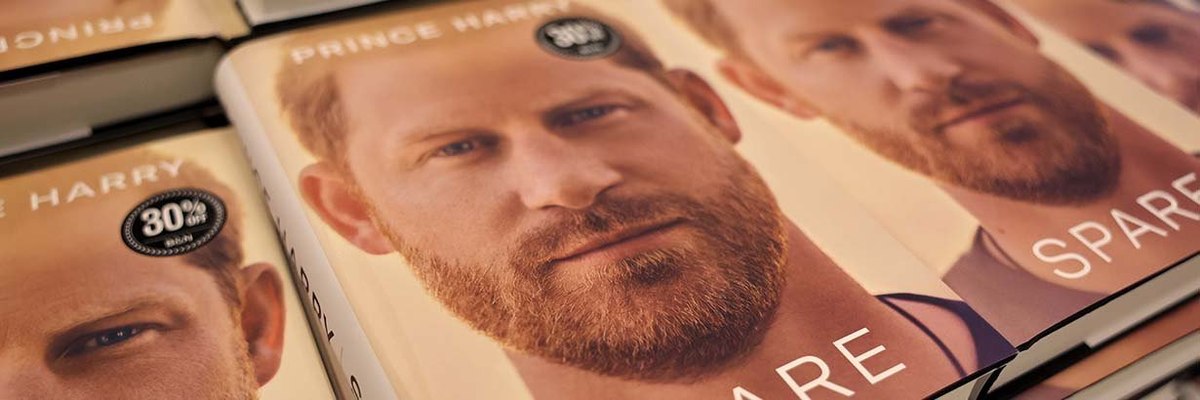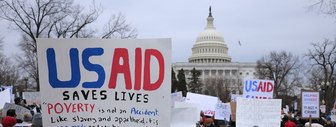While Americans don't have a royal family to call their own — which is as they'd prefer it to be — they are well aware of recent drama surrounding the monarchy of their former ruler across the ocean. Two-thirds of Americans say they've heard about Spare, Prince Harry's newly released memoir — 19% having heard a lot and 50% a little — which currently sits at the top of numerous best-seller lists.
In addition to the book, Harry and his wife Meghan Markle have, over the past year, produced a Netflix series on themselves and participated in a variety of high-profile interviews — many of which have included allegations against other members of the royal family and critiques of the monarchy more broadly. This spate of media appearances has led some to question Harry's motivations.
New polling by YouGov finds that Americans are less likely than Britons to believe Harry's actions are financially motivated (23% in the U.S. say money is the main motive vs. 41% in the UK). And, compared to their British counterparts, Americans are more likely to say Harry is mostly motivated by a desire to tell his side of the story (27% in U.S. vs. 21% in UK). Americans are also twice as likely as Britons to say they're unsure what is motivating Harry (22% vs. 11%).
When asked about nine individual members of the royal family, Americans are more likely to say they hold favorable than unfavorable views of six of them. Among the most likely to be viewed favorably are Prince William (53% favorable, 25% unfavorable) and Princess Catherine (48%, 18%).
While Prince Harry (47% favorable) and Meghan Markle (44%) certainly have their fans among the American public, there is also a significant faction of people with unfavorable views of them (34-36%). The same is true for King Charles III, who is about as likely to be viewed favorably (38%) as unfavorably (40%).
The King's wife, Camilla, is more likely to be viewed unfavorably (45%) than favorably (28%), as is Prince Andrew (47% vs. 25%).
Comparing our most recent results to a poll conducted a month ago in December, we find that opinions of all royal family members have worsened. Looking at each person's net favorability rating — that is, the share of people who view them favorably minus the share who view them unfavorably — we find an 11-percentage-point dip in Prince Harry's rating and an 8-point dip in that of Meghan Markle.
Even the two most popular royals — William and Catherine — have seen American opinions of them fall over the past month. This puts current opinions on the family about closer to where they were in May of last year, prior to Queen Elizabeth II's death.
Even as Americans' views of Harry and Meghan have worsened over the past month, the country as a whole still views the couple far more favorably than the British do. In the UK, they are among the least-liked royals, beating out only Prince Andrew.
As with many seemingly non-political issues in the U.S., opinions on the royals are politically polarized. Democrats are nearly twice as likely as Republicans to have a very or somewhat favorable view of Harry (64% of Democrats vs. 36% of Republicans) and Meghan Markle (62% vs. 34%). Republicans, on the other hand, are slightly more likely than Democrats to have favorable views of William (64% of Republicans vs. 51% of Democrats) and Catherine (56% vs. 49%). Members of each party hold similar views on the other members of the royal family asked about.
Opinions of Prince Harry's book also divide Democrats and Republicans. Democrats are twice as likely as Republicans to believe Harry has mostly been motivated by a desire to tell his side of the story (41% vs. 19%). Republicans, on the other hand, are twice as likely as Democrats to say he's motivated by a desire to make money (32% vs. 15%).
How do Americans feel about the British monarchy in general? One in four (23%) say the monarchy is good for Britain, while more say it's neither good nor bad (33%); somewhat fewer — 16% — say it's bad for Britain.
Americans are divided in their expectations as to whether Britain will still have a monarch in 100 years' time: 40% say it definitely or probably will, while slightly fewer — 35% — say it definitely or probably won't.
Half of Americans (49%) believe the British royal family are an even mix of good and bad role models; more of the rest believe they're mostly good role models (21%) than bad (13%).
— Matthew Smith contributed to this article
See the results for this YouGov poll
Methodology: This poll was conducted online on January 12 - 17, 2023 among 1,000 U.S. adult citizens. Respondents were selected from YouGov’s opt-in panel using sample matching. A random sample (stratified by gender, age, race, education, geographic region, and voter registration) was selected from the 2019 American Community Survey. The sample was weighted according to gender, age, race, education, 2020 election turnout and presidential vote, baseline party identification, and current voter registration status. Demographic weighting targets come from the 2019 American Community Survey. Baseline party identification is the respondent’s most recent answer given prior to March 15, 2022, and is weighted to the estimated distribution at that time (33% Democratic, 28% Republican). The margin of error for the overall sample is approximately 4%.
Image: Getty















